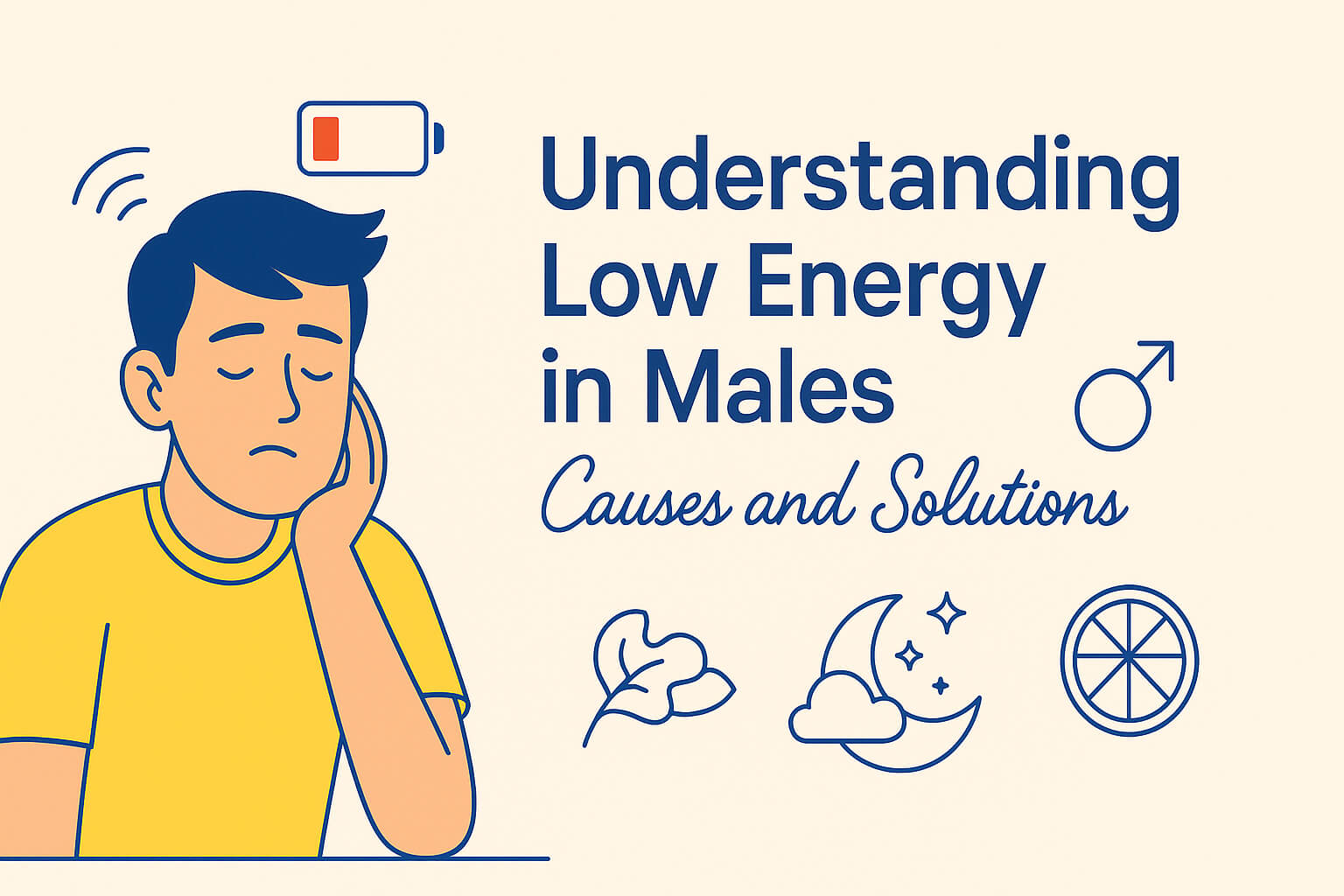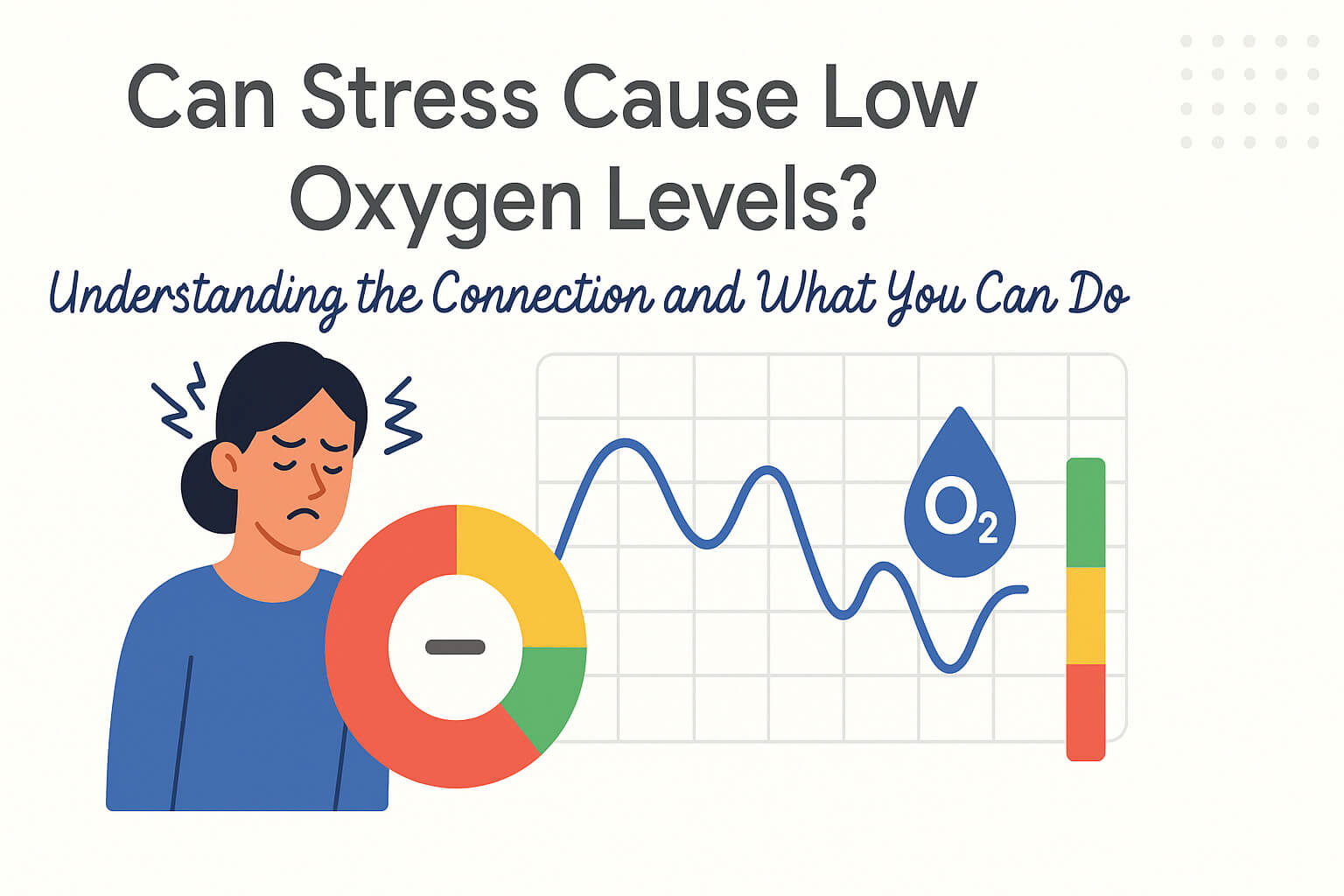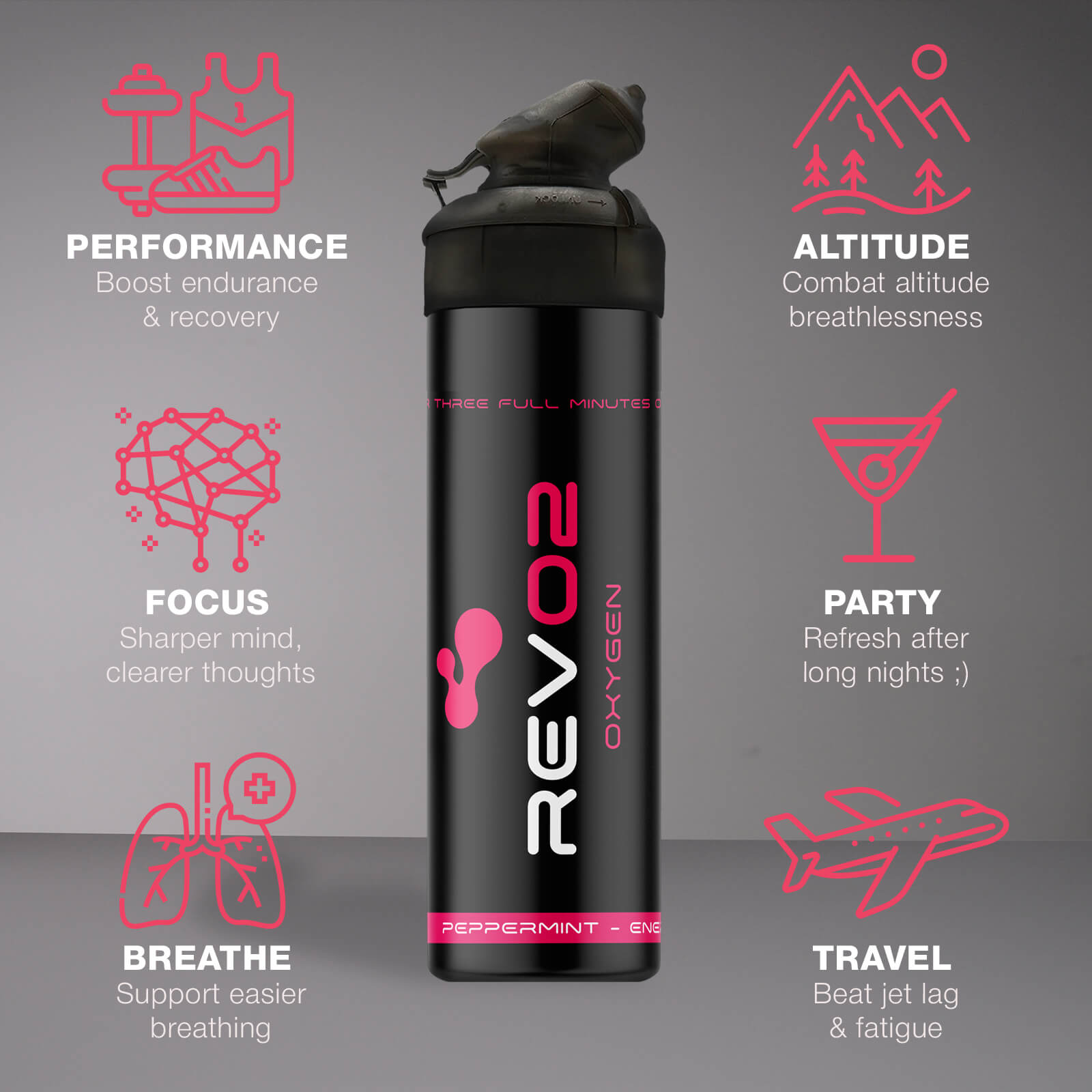Feeling constantly tired? Low energy in males is often due to medical or lifestyle issues. This article explores the causes and what you can do to feel more energetic.
Key Takeaways
- Low energy in males can stem from various factors including hormonal imbalances, poor sleep quality, and nutritional deficiencies.
- Identifying symptoms and seeking medical evaluation are vital steps for diagnosing the root causes of low energy.
- Combining lifestyle changes like regular exercise and a balanced diet with medical treatments can effectively boost energy levels.
Common Causes of Low Energy in Males
Many men find themselves constantly battling low energy levels, a condition that can stem from various medical and lifestyle factors. Conditions like low testosterone, hypothyroidism, and anemia are significant contributors to this fatigue. Additionally, mental health issues can play a critical role. Understanding the root causes is the first step towards reclaiming your energy.
Addressing both medical conditions and lifestyle choices is crucial for improving energy levels. Low testosterone levels, for example, can lead to muscle loss and fat gain, affecting overall vitality. Similarly, poor sleep quality and nutritional deficiencies can significantly drain your energy reserves.
Identifying and addressing these common causes is the first step towards improving your overall well-being and energy levels. Each of these factors impacts your energy in different ways, so it's important to understand them and know what actions to take.

Poor Sleep Quality
Sleep is a cornerstone of good health, yet many men suffer from sleep disorders like insomnia and sleep apnea, which can lead to chronic low energy levels. A lack of sleep impairs cognitive function and overall well-being, making it difficult to get through the day. The National Sleep Foundation recommends getting enough sleep of 7 to 8 hours each night to help raise energy levels.
Reducing screen time before bedtime, cutting down on alcohol and caffeine, and practicing relaxation techniques can enhance sleep quality and may provide a sedative effect. If fatigue persists and you suspect sleep problems, consulting a doctor is advisable to identify any underlying health conditions.
Restless leg syndrome can negatively affect sleep quality and contributes to fatigue. Here are some key points to understand about restless leg syndrome and its impact on energy levels:
- Restless leg syndrome (RLS) causes uncomfortable sensations in the legs, often described as tingling, crawling, or itching, which create an urge to move the legs.
- These sensations often intensify during periods of rest or inactivity, particularly in the evening and at night, making it difficult to fall asleep or maintain uninterrupted sleep.
- The frequent leg movements caused by RLS can lead to fragmented, non-restful sleep, reducing the amount of restorative sleep needed for optimal energy.
- Poor sleep quality from RLS contributes to physical fatigue, impaired concentration, and reduced daytime alertness.
- While the exact cause of restless leg syndrome (RLS) remains unclear, it is thought to involve issues with the brain's dopamine pathways and may be associated with iron deficiency.
- Managing RLS symptoms through lifestyle changes, medication, or addressing underlying conditions can improve sleep quality and help restore energy levels.
- If you experience persistent symptoms of restless leg syndrome, consulting a healthcare provider for diagnosis and treatment options is important to prevent chronic fatigue.
Nutritional Deficiencies
A healthy diet is essential for maintaining energy levels. Nutritional deficiencies, such as low levels of vitamin B12, vitamin D, and magnesium, can lead to chronic fatigue and decreased energy levels. Iron deficiency anemia, which affects the body's ability to produce hemoglobin and transport oxygen, is another common cause of low energy.
For instance, besides fatigue, Vitamin B12 deficiency can sometimes lead to neurological issues like tingling in hands or feet (food sources include meat, fish, dairy). Iron deficiency, beyond tiredness, might present with pale skin or shortness of breath (food sources include red meat, spinach, lentils)." (Always emphasize blood tests for diagnosis)
Blood tests can help identify these deficiencies, allowing for targeted blood test treatments to restore healthy red blood cells vitality.
Here are some top tips to manage restless leg syndrome and improve your sleep quality:
- Maintain a regular sleep schedule by going to bed and waking up at the same time every day to help ensure consistent, restful sleep.
- Engage in moderate physical activity during the day, such as walking or stretching, which can help reduce symptoms.
- Avoid caffeine, nicotine, and alcohol, especially in the evening, as these substances can worsen restless leg symptoms.
- Practice relaxation techniques before bedtime, such as deep breathing, meditation, or warm baths, to calm your nervous system.
- Consider leg massages or using a heating pad or cold compress to soothe leg discomfort.
- Consult a healthcare provider for diagnosis and treatment options, including medications if lifestyle changes are insufficient.
Low Testosterone Levels
Testosterone is vital for maintaining muscle mass, bone density, and overall energy levels. Low testosterone can lead to physical and mental symptoms such as fatigue, mood swings, and decreased motivation. These hormonal imbalances can also affect hormone levels, sex drive, and mental focus, making everyday tasks feel more challenging.
Engaging in regular exercise, particularly strength training, can help manage low testosterone levels. Consulting a healthcare provider for appropriate testosterone testing is advisable if you have suspicions about low testosterone.
Low testosterone levels are clinically considered anything below 300 ng/dL. This condition, known as low T or hypogonadism, can cause persistent fatigue, reduced muscle mass, weight gain, decreased sex drive, and difficulty concentrating. Testosterone naturally declines with age, but a significant drop can lead to mood disorders like depression and anxiety, further contributing to low energy.
Blood tests are essential for diagnosing low testosterone, and if confirmed, testosterone therapy may help restore energy, improve muscle mass, and enhance mood and sex life. However, low testosterone is only one possible cause of low energy in males, so a thorough medical evaluation is important to identify the root cause and guide effective treatment.
Thyroid Gland Problems
The thyroid gland plays a crucial role in regulating metabolism, energy use, and mood. Hypothyroidism, characterized by low thyroid hormone levels, can lead to significant energy fatigue and other health problems, including an underactive thyroid gland. Untreated hypothyroidism can also result in serious conditions like goiter and heart disease, affecting thyroid hormones.
Chronic Health Conditions
Chronic illnesses such as diabetes and heart disease can significantly impact energy levels and may lead to a health problem that results in persistent fatigue, requiring ongoing management to improve overall vitality and keep the blood pumping.
Managing sleep disorders and other chronic health issues, such as restless leg syndrome, is crucial for restoring sleeping energy.
Side Effects of Certain Medications
Some prescription or over-the-counter medications can list fatigue as a common side effect. These can include certain blood pressure medications, antihistamines, antidepressants, or others. If you suspect a medication might be contributing to your low energy, it's important to discuss it with your doctor before making any changes to your regimen.
Mental Health Issues
Mental health issues like anxiety and depression can severely affect energy levels, leading to feelings of chronic fatigue and low vitality.
Mindfulness and relaxation techniques can help manage mental health challenges, thereby improving overall energy levels.
Depression is characterized by a persistent feeling of sadness and loss of interest in life. It can significantly impact energy levels, leading to chronic fatigue and low motivation. Men experiencing depression often find it difficult to engage in daily activities, which can further exacerbate feelings of tiredness and low energy. This mental health condition not only affects emotional well-being but also has physical manifestations, such as disrupted sleep patterns and changes in appetite, both of which contribute to diminished vitality.
Moreover, depression is frequently accompanied by other symptoms like difficulty concentrating, irritability, and feelings of hopelessness, which can interfere with work performance and social interactions. These challenges can create a cycle where low energy leads to decreased activity, which in turn worsens depressive symptoms. Recognizing depression as a potential cause of low energy in males is crucial for effective treatment, as addressing mental health can lead to substantial improvements in overall energy and quality of life.
Treatment for depression often involves a combination of therapy, medication, and lifestyle changes. Cognitive-behavioral therapy (CBT) and counseling can help men develop coping strategies and address negative thought patterns. Antidepressant medications may also be prescribed to correct chemical imbalances in the brain that contribute to depressive symptoms. Additionally, regular physical activity, a balanced diet, and good sleep hygiene can support recovery by boosting energy levels and improving mood. Seeking professional help early can prevent depression from severely impacting energy and daily functioning.
Symptoms and Diagnosis of Low Energy in Males

Identifying symptoms of low energy is crucial for diagnosis and treatment. Symptoms typically include significant energy reduction, persistent fatigue, and difficulty with daily tasks. Staying hydrated is also important, as dehydration can contribute to fatigue.
If you experience unusual fatigue, seeking medical evaluation is important. Blood tests can diagnose conditions like low testosterone, low t, hypothyroidism, and other underlying health issues. Early diagnosis and treatment can prevent chronic low energy from affecting your quality of life.
Recognizing Symptoms
Common symptoms of low energy in males include:
- Persistent fatigue
- Muscle mass loss
- Weight gain
- Changes in mood and sex drive
Mental health conditions like depression and anxiety can also contribute to these symptoms and other symptoms, making it essential to address both physical and mental health medical condition.
Medical Evaluation
If you're constantly feeling tired, consulting your doctor for a thorough evaluation is important. Blood tests can diagnose low testosterone and hypothyroidism, helping to pinpoint the cause of your fatigue.
Chronic illnesses also need to be evaluated by a healthcare professional to manage and improve energy levels.
Identifying Underlying Conditions
Various conditions can lead to fatigue in men, including sleep apnea, iron deficiency anemia, and hormonal imbalances. Diagnosing and treating these underlying conditions is crucial for restoring energy levels and improving overall well-being.
Effective Strategies to Boost Energy Levels
Boosting energy levels usually requires a mix of lifestyle changes and medical treatments. Simple adjustments such as regular exercise, a balanced diet, and proper hydration can significantly enhance your energy level.
Persistent tiredness can hinder daily tasks, but the right strategies can help you reclaim your vitality.
Regular Exercise
Regular physical activity is highly effective in boosting energy levels. Even a brief 15-minute walk can provide an immediate energy boost, with benefits increasing through consistent activity.
Strength training, in particular, can enhance muscle mass and metabolism, contributing to higher energy levels and more energy.
Balanced Diet
A balanced diet rich in protein, vegetables, and whole grains, while avoiding junk food and sugar, can help stabilize energy levels. Complex carbohydrates provide sustained energy, making it easier to maintain vitality throughout the day.
Power Up Your Plate: Examples of Energy-Boosting Foods
- Complex Carbohydrates (Sustained Energy): Oats, quinoa, brown rice, sweet potatoes, whole-grain bread.
- Lean Proteins (Muscle Repair & Satiety): Chicken breast, fish (especially fatty fish like salmon for omega-3s), lentils, beans, tofu, Greek yogurt.
- Healthy Fats (Brain Health & Energy Reserves): Avocados, nuts (almonds, walnuts), seeds (chia, flax, pumpkin), olive oil.
- Vitamin & Mineral Rich Fruits/Vegetables: Spinach, kale, berries, oranges, bell peppers.
- Quick Tip: Consider a "Foods That Drain Energy" mini-list too: highly processed snacks, sugary drinks, excessive refined carbohydrates.
Hydration
Proper hydration is essential for sustaining energy levels. Mild dehydration can impair cognitive performance and physical stamina, so drinking water regularly is crucial. Staying hydrated throughout the day can prevent energy fatigue and ensure optimal bodily functions.
Sleep Hygiene
Good sleep hygiene is essential for improving overall energy levels. Consistent sleep patterns, a relaxing bedtime environment, and a calming pre-sleep routine can enhance sleep quality, leading to a good night's sleep and better daytime energy.
Stress Management
Managing stress is key to maintaining high energy levels. Mindfulness practices like meditation and deep-breathing techniques can significantly reduce stress and enhance mental clarity.
If stress becomes overwhelming, seeking professional help can provide effective coping strategies.
Medical Treatments for Low Energy

When lifestyle changes aren't sufficient, medical treatments may be necessary to manage low energy. Medical interventions can effectively address chronic low energy, helping you feel more energetic and vibrant.
Consulting with a healthcare provider is essential to determine the most appropriate medical treatment options.
Hormone Therapy
Hormone replacement therapy can relieve fatigue associated with low testosterone levels. Testosterone therapy can improve energy levels, mood, and libido, but it's important to weigh the benefits against potential risks like male-pattern balding.
Medications and Supplements
Certain medications and supplements can address specific deficiencies or health conditions contributing to low energy. For instance, antidepressants or stimulants can help alleviate fatigue related to underlying issues.
For example, if a blood test confirms iron deficiency, a doctor might prescribe iron supplements. Similarly, Vitamin D supplements are often recommended for low levels. For conditions like depression contributing to fatigue, a healthcare provider might discuss antidepressants. It's crucial to only take supplements for diagnosed deficiencies or under medical advice, as some can have side effects or interact with other medications.
Consulting with a healthcare provider ensures these treatments are appropriate and effective.
Treating Underlying Conditions
Treating underlying medical conditions, such as hypothyroidism or chronic fatigue syndrome, is crucial for restoring energy levels. Medications like Levothyroxine can effectively manage hypothyroidism, while a combination of therapy, medication, and lifestyle changes can help treat chronic fatigue syndrome.
Summary
Understanding the causes of low energy in males and implementing effective strategies can significantly improve energy levels and overall well-being. From lifestyle changes to medical treatments, various approaches can help restore your vitality. By addressing both medical conditions and lifestyle choices, you can take control of your energy levels and live a more vibrant life.
It's important to remember that identifying the root cause of low energy and finding effective solutions can sometimes take time and persistence. Be patient with yourself, celebrate small improvements, and continue to work with your healthcare provider. Reclaiming your energy is a journey, and you've already taken a positive step by seeking to understand it better.
Frequently Asked Questions
What are common causes of low energy in males?
Low energy in males is often due to poor sleep, nutritional deficiencies, low testosterone, thyroid issues, chronic health problems, or mental health struggles. If you're feeling more tired than usual, it might be worth looking into these factors.
How can I recognize symptoms of low energy?
If you're feeling persistently fatigued, experiencing mood swings, or noticing a loss of muscle mass, these might be signs of low energy. Keep an eye on these symptoms; they can be signals that something needs your attention.
What lifestyle changes can boost my energy levels?
Making lifestyle changes like incorporating regular exercise, eating a balanced diet, staying hydrated, improving your sleep habits, and managing stress can really boost your energy levels. It's all about finding what works for you and sticking with it!
When should I seek medical evaluation for low energy?
If you're feeling unusually fatigued or experiencing persistent low energy, it's time to see a healthcare provider for a proper evaluation. Don't ignore those signs; it's important to get to the bottom of it.
What medical treatments are available for low energy?
If you're feeling low on energy, various medical treatments can help, including hormone therapy, medications, and supplements. It's also important to address any underlying conditions that might be contributing to your fatigue.
References
- Bhasin S. et al. (2018). Testosterone Therapy in Men with Hypogonadism. The Journal of Clinical Endocrinology & Metabolism. Read Study
- Medic G. et al. (2017). Short- and long-term health consequences of sleep disruption. Nature and Science of Sleep. Read Study
- Gröber U. et al. (2013). Vitamin D: Update 2013. Dermato-Endocrinology. Read Study


















